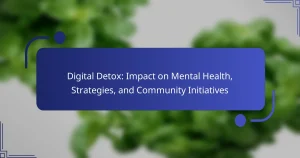Holistic nutrition promotes overall well-being through the interconnectedness of body, mind, and spirit. It emphasizes whole foods, balanced meals, and mindful eating. Key benefits include improved digestion, increased energy, and emotional balance. Support groups provide motivation and accountability, enhancing the journey toward sustainable health.

What are the foundational principles of holistic nutrition?
Holistic nutrition focuses on the interconnectedness of body, mind, and spirit. It emphasizes whole foods, balanced meals, and mindful eating to promote overall well-being. Key principles include nutrient density, food variety, and individualization of dietary choices. Holistic nutrition also considers emotional and environmental factors that influence health. This approach supports sustainable practices and encourages community engagement, enhancing both personal and collective health outcomes.
How does holistic nutrition differ from conventional dietary approaches?
Holistic nutrition emphasizes the whole person, integrating physical, emotional, and spiritual well-being, unlike conventional diets that often focus solely on calorie counting and macronutrient ratios. Holistic approaches consider individual health needs and lifestyle factors, promoting personalized nutrition plans. This method fosters a deeper connection with food, encouraging awareness of dietary choices and their impact on overall health. Additionally, holistic nutrition often incorporates natural foods and mindfulness practices, contrasting with conventional methods that may rely on processed options.
Why is a balanced diet essential in holistic nutrition?
A balanced diet is essential in holistic nutrition because it supports overall well-being by providing necessary nutrients. A diverse intake of vitamins, minerals, proteins, and healthy fats promotes physical health and mental clarity. Balanced nutrition enhances energy levels and reduces the risk of chronic diseases. Additionally, it fosters a harmonious relationship between body and mind, contributing to emotional stability. In holistic nutrition, the focus is on treating the individual as a whole, making a balanced diet a foundational principle for optimal health.
Which nutrients are prioritized in holistic nutrition practices?
Holistic nutrition practices prioritize a balance of macronutrients, micronutrients, and phytonutrients. Key nutrients include whole foods, healthy fats, lean proteins, and a variety of fruits and vegetables. This approach emphasizes nutrient density over caloric intake, focusing on the quality of food. Additionally, holistic nutrition considers the individual’s unique dietary needs and preferences, promoting personalized nutrition plans.

What are the key benefits of adopting holistic nutrition?
Adopting holistic nutrition offers numerous benefits that enhance overall well-being. These include improved digestion, increased energy levels, better mental clarity, and a strengthened immune system. Holistic nutrition emphasizes the importance of whole foods and balanced meals, which provide essential nutrients. As a result, this approach can lead to sustainable weight management and reduced risk of chronic diseases. Furthermore, it fosters a deeper connection between mind and body, promoting emotional balance and resilience.
How does holistic nutrition support mental health and well-being?
Holistic nutrition significantly enhances mental health and well-being by addressing the whole person. It emphasizes balanced diets rich in nutrients that support brain function and emotional stability. Whole foods, such as fruits, vegetables, and whole grains, provide essential vitamins and minerals that promote neurotransmitter production, impacting mood regulation.
Research indicates that omega-3 fatty acids, found in fish and flaxseeds, may reduce symptoms of depression and anxiety. Additionally, holistic nutrition encourages mindful eating practices, fostering a deeper connection to food and self-awareness. Support groups focused on holistic nutrition can offer community and shared experiences, enhancing motivation and accountability in maintaining healthy dietary habits.
In what ways can holistic nutrition enhance physical health?
Holistic nutrition enhances physical health by promoting balanced diets, mindful eating, and individualized meal plans. It supports better digestion, boosts energy levels, and strengthens the immune system. Incorporating whole foods and reducing processed options leads to improved overall well-being. This approach fosters a deeper connection to food and encourages healthier lifestyle choices.
Which chronic conditions can be managed through holistic nutrition?
Holistic nutrition can effectively manage chronic conditions such as diabetes, hypertension, obesity, digestive disorders, and autoimmune diseases. These conditions benefit from a nutrient-dense diet focusing on whole foods, which can reduce inflammation and improve overall health. For example, a balanced intake of fruits, vegetables, and healthy fats supports metabolic function and enhances immune response. Support groups often emphasize the role of dietary changes in symptom management and disease prevention, fostering community and accountability among participants.

How can individuals implement holistic nutrition in their daily lives?
Individuals can implement holistic nutrition by focusing on whole foods, mindful eating, and balanced meals. Start by incorporating a variety of fruits and vegetables into daily meals. Prioritize whole grains and lean proteins to enhance nutrient intake.
Additionally, practicing mindful eating helps individuals recognize hunger cues and promote a positive relationship with food. Joining support groups can provide motivation and accountability, fostering a community centered on holistic health.
Regularly assessing personal dietary choices allows for adjustments that align with holistic principles, ensuring a sustainable approach to nutrition.
What are practical meal planning strategies for holistic nutrition?
Practical meal planning strategies for holistic nutrition include focusing on whole foods, balancing macronutrients, and incorporating seasonal produce. Prioritize meal prep to save time and ensure healthy choices. Use batch cooking techniques to prepare meals in advance. Engage with support groups for motivation and recipe sharing.
How does food sourcing impact holistic nutrition choices?
Food sourcing significantly influences holistic nutrition choices by prioritizing quality, sustainability, and local availability. Sourcing organic, seasonal, and locally produced foods enhances nutrient density and supports community health. Additionally, these choices align with holistic principles, promoting environmental stewardship and ethical consumption. As a result, individuals can achieve better health outcomes while contributing positively to their surroundings.
Which lifestyle changes complement a holistic nutrition approach?
Adopting lifestyle changes enhances a holistic nutrition approach. Key changes include regular physical activity, stress management techniques, adequate sleep, and mindful eating practices. These changes support overall health and well-being, reinforcing the principles of holistic nutrition. Integrating community support through groups can also provide motivation and accountability.

What role do support groups play in holistic nutrition?
Support groups play a vital role in holistic nutrition by providing emotional support and shared experiences. They foster accountability, motivation, and a sense of community among individuals pursuing healthier lifestyles. Participants gain insights from diverse perspectives, enhancing their understanding of nutrition’s impact on overall well-being. Support groups can also offer resources, such as meal planning ideas and coping strategies, which are essential for maintaining holistic nutritional practices.
How can joining a support group enhance commitment to holistic nutrition?
Joining a support group enhances commitment to holistic nutrition by providing accountability, shared experiences, and emotional support. These groups foster a sense of community, motivating members to adhere to their nutritional goals. Regular interactions with like-minded individuals reinforce positive behaviors and offer practical advice. Research indicates that social support significantly improves adherence to dietary changes, making support groups a valuable resource for those pursuing holistic nutrition.
Which types of support groups are available for holistic nutrition enthusiasts?
Various support groups exist for holistic nutrition enthusiasts, including online forums, local meetups, and professional organizations. These groups offer community support, resources, and shared experiences. Online platforms like social media groups provide accessibility, while local meetups foster personal connections. Professional organizations often host workshops and seminars, enhancing knowledge and networking opportunities.

What unique challenges do individuals face in holistic nutrition?
Individuals face unique challenges in holistic nutrition, including integrating diverse dietary practices, overcoming misinformation, and maintaining consistency. Adapting to a holistic approach requires a deep understanding of whole foods and their interactions, which can be overwhelming. Support systems, such as community groups, can provide essential guidance and motivation. Additionally, navigating emotional connections to food presents a rare but significant hurdle, complicating the journey toward balanced nutrition.
How can cultural differences influence holistic nutrition practices?
Cultural differences significantly shape holistic nutrition practices by influencing dietary choices and health beliefs. For instance, traditional diets often reflect cultural heritage, emphasizing local ingredients and preparation methods.
In some cultures, holistic nutrition integrates spiritual practices, viewing food as medicine. This perspective can lead to unique dietary restrictions or preferences that prioritize balance and harmony.
Additionally, cultural attitudes toward health and wellness determine the acceptance of holistic approaches. Communities may vary in their openness to alternative therapies, impacting the adoption of holistic nutrition.
Finally, social support systems within cultures can enhance or hinder holistic nutrition practices. Groups that promote collective well-being often encourage healthier eating habits, fostering a supportive environment for holistic approaches.
What are common misconceptions about holistic nutrition?
Common misconceptions about holistic nutrition include the belief that it is solely about diet, that it lacks scientific backing, and that it is a one-size-fits-all approach. Many think holistic nutrition only focuses on food choices, ignoring the importance of lifestyle factors like stress management and sleep. Additionally, some individuals believe holistic nutrition is unproven, but numerous studies support its benefits for overall health. Lastly, the idea that holistic nutrition applies universally to everyone overlooks the unique needs and preferences of individuals, which are essential for effective dietary changes.

What expert tips can enhance the effectiveness of holistic nutrition?
Incorporating expert tips can significantly enhance the effectiveness of holistic nutrition. Focus on integrating whole foods, maintaining balance, and personalizing dietary choices based on individual needs.
1. Prioritize whole foods for nutrient density.
2. Emphasize balance among macronutrients.
3. Personalize nutrition plans to fit unique lifestyles.
4. Incorporate mindfulness practices during meals.
5. Stay hydrated to support overall health.
6. Engage with support groups for motivation and accountability.
How can individuals avoid common pitfalls in holistic nutrition?
Individuals can avoid common pitfalls in holistic nutrition by focusing on balanced diets, understanding individual needs, and seeking professional guidance. Prioritize whole foods over processed options to enhance nutrient intake. Recognize that personalized nutrition is essential, as one size does not fit all. Engage with support groups for accountability and shared experiences. This approach fosters a sustainable and informed journey toward optimal health.
What resources are available for ongoing education in holistic nutrition?
Various resources for ongoing education in holistic nutrition include online courses, workshops, certification programs, and support groups. Online platforms like Coursera and Udemy offer courses on holistic nutrition principles. Certification programs from recognized institutions provide in-depth knowledge and credentials. Workshops often feature expert speakers and hands-on learning. Support groups, both online and local, foster community and shared experiences. These resources enhance understanding and application of holistic nutrition principles.


